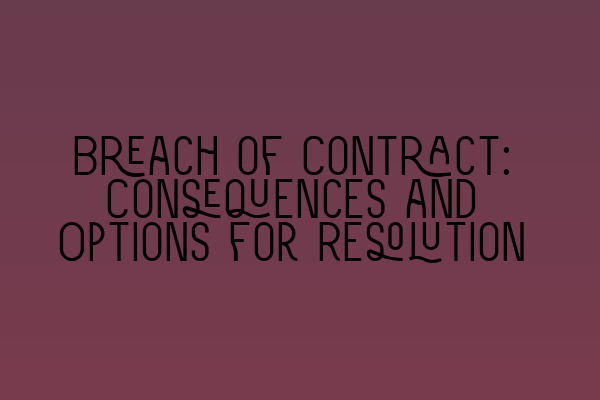Breach of Contract: Consequences and Options for Resolution
Have you recently encountered a breach of contract? Are you uncertain about the potential consequences and what options are available to resolve the situation? Look no further! As experienced solicitors in contract law, we are here to guide you through the intricacies of breach of contract claims. In this blog post, we will explore the consequences of breaching a contract and discuss various options for resolution.
Understanding Breach of Contract:
In legal terms, a breach of contract occurs when one party fails to fulfill their obligations as stipulated in the written or verbal agreement. Breaches can range from minor deviations to substantial non-performance. When a breach occurs, the non-breaching party may suffer financial losses or be deprived of expected benefits. It is crucial to address breaches quickly to mitigate potential damages and seek appropriate remedies.
Consequences of Breach:
Consequences vary depending on the type and severity of the breach. Let’s dive into a few potential outcomes:
1. Damages: The most common remedy for breach of contract is monetary compensation. Damages aim to compensate the innocent party for losses incurred due to the breach. There are two types of damages:
a. Compensatory Damages: These are designed to put the non-breaching party back in the position they would have been in had the breach not occurred. Courts will evaluate the actual losses sustained, including direct and indirect damages.
b. Consequential Damages: These are additional damages resulting from the breach, but not directly related to the contract itself. They are reasonably foreseeable losses that flow from the breach, such as lost profits or opportunities.
2. Specific Performance: In some cases, the court may order the breaching party to fulfill their contractual obligations as originally agreed. This remedy is typically used when the subject matter of the contract is unique or when monetary compensation cannot adequately remedy the harm caused.
3. Rescission or Cancellation: Rescission refers to the cancellation of the contract, with both parties released from their obligations. It is often pursued when the contract was fundamentally flawed or based on fraudulent representations. Restitution may be awarded to return both parties to their pre-contractual positions.
4. Injunctions: Seeking injunctive relief can prevent the breaching party from acting in a way that would cause further harm or jeopardize the non-breaching party’s interests. Injunctions are commonly used when monetary compensation cannot adequately rectify the harm caused.
Options for Resolution:
When facing a breach of contract, you have several options for resolution:
1. Mediation and Negotiation: Parties can engage in negotiation or mediation to reach a mutually satisfactory resolution. This option can save time and costs associated with litigation. A neutral third-party mediator facilitates discussions, assisting the parties in finding a middle ground.
2. Arbitration: Binding arbitration is a more formal alternative to litigation. The parties present their case to an arbitrator who reviews the evidence and makes a final decision. Arbitration can be quicker and less expensive than going to court, offering a more private and confidential resolution process.
3. Litigation: If all other avenues for resolution fail, litigation may be necessary. This involves filing a lawsuit and presenting the case before a judge. Litigation is a formal and structured process, which can take time, and costs can escalate. However, it provides a comprehensive resolution and is often the only option for complex disputes.
Conclusion:
Breach of contract cases can be complex, and it is essential to understand the consequences and available options for resolution. Whether seeking damages, specific performance, rescission, or injunctive relief, it is advisable to consult with legal professionals who specialize in contract law. By considering mediation, arbitration, or litigation, you can find the best approach to protect your rights and achieve a favorable outcome. Our experienced solicitors are here to provide expert guidance and help you navigate through the complexities of breach of contract claims.
